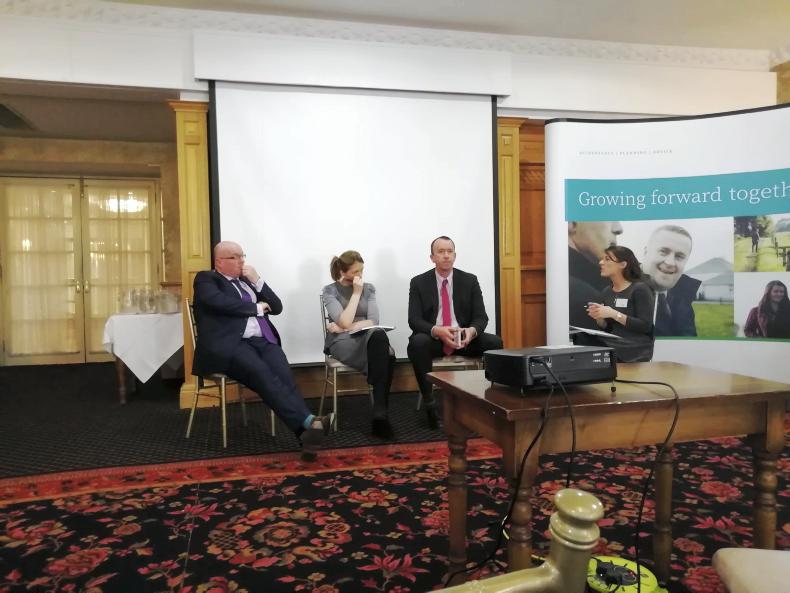At the Agriculture Science Association’s (ASA) budget discussion event communication, culture and carbon featured prominently during discussions. Speaking at the event were agri-solicitor Aisling Meehan, head of tax at Ifac Declan McEvoy and IFA farm business chair Martin Stapleton.
Communication
Aisling opened the event by detailing recent changes to agri-taxation, particularly agricultural reliefs, following a taxation review conducted in 2014. She explained that often farmers do not realise the reliefs they are entitled to.
She said stock relief for partnerships and for young trained farmers was one such example. According to figures from Revenue, there were just 360 claims for partnership stock relief but the claims were worth on average €14,000 to the farmers involved.
When it came to succession, she said it was important farmers consulted with agricultural specialists to ensure they minimised any potential tax liabilities.
Culture
Declan highlighted the upcoming changes to the PAYE system where Revenue were moving from a paper-based return system to regular online reporting from January 2019.
He said farmers will have to adjust to the system and a move from net to gross wage.
He noted it would be more challenging for farms with irregular labour rather than those with full-time employees. He said that while the initial three to six months would cause hassle and confusion, when it was up and running it would focus farmers’ minds on how much labour was costing.
Carbon
Martin Stapleton gave a run-through of what had been introduced for farmers in the budget, including ANC payments and the BEEP scheme for sucklers.
He also addressed the absence of a carbon tax which many had thought likely. He said such a tax would disproportionately impact people living in rural area who depended on diesel and petrol to conduct day-to-day business.
He said it did not make sense to introduce a flat-rate tax on diesel if there was no alternative available. He also pointed out that a carbon tax would increase input costs at a time when prices were static or declining for many sectors.
Read more
Watch: farmers react to Budget 2019
Budget 2019: positives for farming, but more is needed
At the Agriculture Science Association’s (ASA) budget discussion event communication, culture and carbon featured prominently during discussions. Speaking at the event were agri-solicitor Aisling Meehan, head of tax at Ifac Declan McEvoy and IFA farm business chair Martin Stapleton.
Communication
Aisling opened the event by detailing recent changes to agri-taxation, particularly agricultural reliefs, following a taxation review conducted in 2014. She explained that often farmers do not realise the reliefs they are entitled to.
She said stock relief for partnerships and for young trained farmers was one such example. According to figures from Revenue, there were just 360 claims for partnership stock relief but the claims were worth on average €14,000 to the farmers involved.
When it came to succession, she said it was important farmers consulted with agricultural specialists to ensure they minimised any potential tax liabilities.
Culture
Declan highlighted the upcoming changes to the PAYE system where Revenue were moving from a paper-based return system to regular online reporting from January 2019.
He said farmers will have to adjust to the system and a move from net to gross wage.
He noted it would be more challenging for farms with irregular labour rather than those with full-time employees. He said that while the initial three to six months would cause hassle and confusion, when it was up and running it would focus farmers’ minds on how much labour was costing.
Carbon
Martin Stapleton gave a run-through of what had been introduced for farmers in the budget, including ANC payments and the BEEP scheme for sucklers.
He also addressed the absence of a carbon tax which many had thought likely. He said such a tax would disproportionately impact people living in rural area who depended on diesel and petrol to conduct day-to-day business.
He said it did not make sense to introduce a flat-rate tax on diesel if there was no alternative available. He also pointed out that a carbon tax would increase input costs at a time when prices were static or declining for many sectors.
Read more
Watch: farmers react to Budget 2019
Budget 2019: positives for farming, but more is needed






 This is a subscriber-only article
This is a subscriber-only article











SHARING OPTIONS: